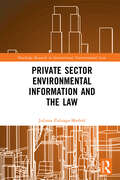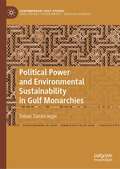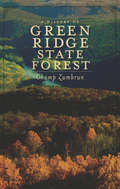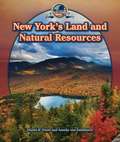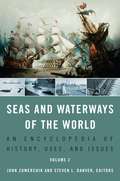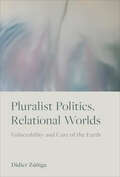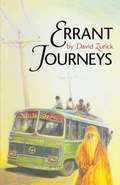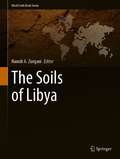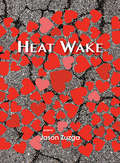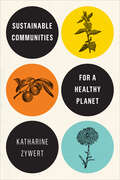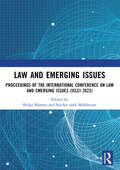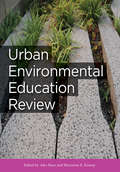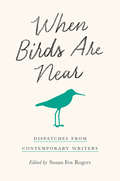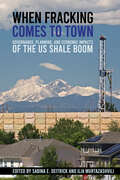- Table View
- List View
Amazing But True Fishing Stories
by Allan Zullo Bruce NashA school of fish raining from the sky . . . anglers catching eighty-three sailfish in one day-fish tales? No, Amazing but True Fishing Stories. In the tradition of Nash and Zullo's Amazing but True Golf Facts and The Sports Hall of Shame book series comes a compendium of true tales, angling antics, and fish facts. This is a book that once again demonstrates how truth can be stranger than fiction. Consider: the Frenchman who caught 590 fish in one hour with a single pole; the angler who used his rod and reel to hook and save a drowning woman; the man who lost his thumb in a boating accident-and found it seven months later, in the belly of a trout! These and many more terrific tales, crazy catches, and daring duels can be found in Amazing but True Fishing Stories.
Private Sector Environmental Information and the Law (Routledge Research in International Environmental Law)
by Juliana Zuluaga MadridCurrent advancements in civil rights and environmental activism emphasize the crucial importance of making environmental information widely available to the public, regardless of whether it is in the hands of the government or of corporations, especially when the information is needed to understand and prevent risks for human health and the environment. In the wake of a resurgence of environmental and civil rights activism, conflicts flare between the right of the people to know and the right of private actors to keep certain information hidden, mostly for commercial reasons. This book offers a detailed comparative analysis of how environmental information is being accessed in different countries and jurisdictions, and how these issues are currently being handled by judges and governments. Focusing on the right of access to environmental information held and produced by private actors and the legal issues that emerge when other values and rights are compromised, this book offers an alternative framework to improve on current legal systems, suggesting a more nuanced and balanced approach that takes both set of interests duly into consideration. Providing an integrated approach to public environmental law and private commercial law, the book integrates the arguments from both sides to establish a common ground, defining shared principles and models that provide a solid basis for a robust new system. Reviewing access to private sector information at a truly international level, this book will be relevant to students, academics and practitioners working in these areas.
Political Power and Environmental Sustainability in Gulf Monarchies (Contemporary Gulf Studies)
by Tobias ZumbraegelThis book offers a new perspective about the Gulf Arab states entering a post-oil era by looking at the political factors behind the green transformation. It discusses the recent ‘environmental enthusiasm’ in the oil- and gas-rich Gulf monarchies by asking how political power can be constituted through advocating environmental sustainability. While hydrocarbon-wealthy Gulf monarchies have been viewed as the globe’s ‘hydrocarbon powerhouse’ with an immense ecological footprint, efforts towards sustainability and environmental protection measures are increasingly monitored. Climate Change, environmental, degradation and the global pressure towards a low-carbon development are threatening the very basis of economic and political power of the oil- and gas-exporting Gulf monarchies. So far, discussions about this fundamental transformation have barely elaborated how it affects and reorganizes political power games in the region. This book attempts to overcome the dominant focus of techno economic drivers of change and uncovers how environmental sustainability impacts state-society and state-elite relationships as well as shaping regional and even global geopolitics.
A History of Green Ridge State Forest
by Champ ZumbrunGreen Ridge State Forest is a haven of calm and natural beauty among the Appalachians of western Maryland. This land was once the frontier of the nation, and trailblazers such as Thomas Cresap and George Washington were among the first Europeans to discover its wonders: the swift Potomac, the flowering dogwood and pine in the mountain reaches and the nighttime calls of the bobcat and the barred owl. The vision and stewardship of people like forester Fred W. Besley preserved the forest for future generations of hikers, explorers and families. Join former forest manager Champ Zumbrun as he traverses hidden trails to tell the remarkable story of Green Ridge State Forest.
New York's Land And Natural Resources (Spotlight on New York)
by Amelie Von Zumbusch Daniel R. FaustIntroduces the main geographical features of New York and describes the environmental views of Native Americans and early settlers, the struggle to control its resources, and the role of New York's waterways and minerals in its development.
Seas And Waterways Of The World: An Encyclopedia Of History, Uses, And Issues
by John Zumerchik Steven L. Danver Steven Laurence DanverWritten at the level of high school and up, this two-volume reference offers an introduction to the use of the world's seas and waterways in history and during modern times, emphasizing the importance of seas and waterways to civilization. The reference's 134 entries are grouped in three sections. The section on the history of the world's seas and waterways contains entries on specific bodies of water around the world. The section on uses of the world's seas and waterways describes areas such as agriculture, coastal tourism, diving, oil and natural gas, sailing, surfing, passenger shipping, wave energy, and wind energy. The last section looks at issues pertaining to seas and waterways, such as cartography, dredging, lighthouses, laws and treaties, port operations, research vessels, and trade and transportation. Many entries contain b&w photos and maps. A chronology and a glossary are included. Zumerchik has written a previous reference work. Danver teaches history at National University.
Pluralist Politics, Relational Worlds: Vulnerability and Care of the Earth
by Didier ZúñigaIn Pluralist Politics, Relational Worlds, Didier Zúñiga examines the possibility for dialogue and mutual understanding in human and more-than-human worlds. The book responds to the need to find more democratic ways of listening to, giving voice to, and caring for the variety of beings that inhabit the earth. Drawing on ecology and sustainability in democratic theory, Zúñiga demonstrates the transformative potential of a relational ethics that is not only concerned with human animals, but also with the multiplicity of beings on earth, and the relationships in which they are enmeshed. The book offers ways of cultivating and fostering the kinds of relations that are needed to maintain human and more-than-human diversity in order for life to persist. It also calls attention to the quality of the relationships that are needed for life to flourish, advancing our understanding of the diversity of pluralism. Pluralist Politics, Relational Worlds ultimately presses us to question our own condition of human animality so that we may reconsider the relations we entertain with one another and with more-than-human forms of life on earth.
Errant Journeys: Adventure Travel in a Modern Age
by David ZurickIn this pathfinding book, David Zurick explores the fastest-growing segment of the travel industry--adventure travel. He raises important questions about what constitutes the travel experience and shows how the modern adventure industry has commercialized the very notion of adventure by packaging it as tours.
The Soils of Libya (World Soils Book Series)
by Hamdi A. ZurqaniThis book presents the soil pedodiversity in Libya. Soils are the source of all life; there can be no life without them. Further, each soil has its own history and its present conditions, which have been shaped by many different factors (e.g. climate, biota, parent material, and relief or topography). The book, divided into eight chapters, provides extensive information on Libyan soils. Chapter one provides an introduction and a broad perspective of the subject, while Chapter two covers the history of soil mapping and research in Libya. Chapter three focuses on local factors of soil formation and describes the geology and climate of the region to explain the diversity of its soils. Chapter four discusses soil classification systems and those most commonly used in the country. The fifth chapter illustrates the constraints and limiting factors that negatively affect agricultural activities across the country. The land cover/land use and the vegetation of the country are described in Chapter six. In turn, Chapter seven presents the status quo of soil biology, the corresponding related research activities, and the other biological properties of Libyan soils. The final chapter (Chapter eight) focus on land degradation and desertification in Libya, emphasizing the main causes, impacts of the phenomena, and efforts to combat it. This book demonstrates the problems that the country is currently facing as a result of climate change, soil erosion, salinization, and pollution, and outlines potential remedies to improve local food security. Bringing together the perspectives and expertise of many distinguished scientists from various universities and institutions in and outside of Libya, the book represents a unique and highly valuable resource.
Heat Wake
by Jason ZuzgaMixing science with humor, humanity, whimsy and love, Jason Zuzga's debut collection is a revelation. In Heat Wake, the reader encounter natures in myriad forms, all crafted from the unusual perspective of a poet astonished by the world and at work among the queerness of life, the odd sweetness of other people, the city, nature, love, and humanity. The poems unfold amid the presence of stubborn rocks, the vast ocean and its shores, the intimate details of a suburban New Jersey landscape. The book's exuberant poems take a journey through time itself: the limited time of humans versus time evolutionary and geological. The poems present in rollicking, playful language and joyful imagery, glancing at the infinite and at the future imagined from the desert in Arizona to Mars. "Charming, witty, and science-y smart, these debut collection poems pop with volleys of youthful and wise acts, tactics, maneuvers, catastrophes, scenes, and did I mention love poems overrunning! --Jane Miller
Iditarod Memories: 30 Years of Poster Art from the Last Great Race
by Jona Van ZyleA collection of annual posters from the official artist of the Iditarod Trail Sled Dog Race. Included are stories about how each of the first 30 posters came to be created, and the stories they tell about the race.
Sustainable Communities for a Healthy Planet
by Katharine ZywertSustainable Communities for a Healthy Planet presents an unconventional collection of ideas, practices, and ways of living together with the potential to enable long-term human and planetary health. Grounded in first-hand accounts from researchers, health practitioners, and social innovators across diverse fields, Katharine Zywert’s book argues that the most promising approaches often depart substantially from the incentive structures, goals, and mindsets that define the status quo and do not necessarily align with mainstream sustainability discourses. The book instead presents promising approaches that disrupt dominant ideas about mental health, ageing, and chronic illness; circumvent exploitative markets for medications, medical technologies, and professionalized care; attend not only to the health of individual human bodies, but to the health of internal ecologies, human populations, nonhuman species, and the planet as a whole; and embody alternative, more inclusive ways of practicing medicine within communities and ecosystems. The stories assembled in this book illustrate how human beings might live healthy lives, supported by health systems that are not dependent on perpetual economic growth. Sustainable Communities for a Healthy Planet challenges conventional ways of thinking about the future of health systems and asks hard questions about what it takes to cultivate human and planetary health in a time of rapid ecological, economic, and social change.
Informing Decisions in a Changing Climate
Everyone--government agencies, private organizations, and individuals--is facing a changing climate: an environment in which it is no longer prudent to follow routines based on past climatic averages. State and local agencies in particular, as well as the federal government, need to consider what they will have to do differently if the 100-year flood arrives every decade or so, if the protected areas for threatened species are no longer habitable, or if a region can expect more frequent and more severe wildfires, hurricanes, droughts, water shortages, or other extreme environmental events. Both conceptually and practically, people and organizations will have to adjust what may be life-long assumptions to meet the potential consequences of climate change. How and where should bridges be built? What zoning rules may need to be changed? How can targets for reduced carbon emissions be met? These and myriad other questions will need to be answered in the coming years and decades. Informing Decisions in a Changing Climate examines the growing need for climate-related decision support--that is, organized efforts to produce, disseminate, and facilitate the use of data and information in order to improve the quality and efficacy of climate-related decisions. Drawing on evidence from past efforts to organize science for improved decision making, it develops guidance for government agencies and other institutions that will provide or use information for coping with climate change. This volume provides critical analysis of interest to agencies at every level, as well as private organizations that will have to cope with the world's changing climate.
Law and Emerging Issues: Proceedings of the International Conference on Law and Emerging Issues (ICLEI 2023)
In the ever-evolving landscape of law and governance, adaptation and innovation are key to addressing the challenges of our times. This edited volume is a testament to the ever-evolving nature of the legal field and the ongoing efforts of legal scholars and academicians to dissect, analyze, and grapple with the challenges and opportunities presented by these changes. The topics covered in this book span a wide spectrum of legal domains, reflecting the complex and rapidly changing nature of our contemporary world. From corporate governance structures to emerging challenges in the digital space, from analyzing the implications of the Social Security Code 2020 in India to understanding the legal developments surrounding unorganized migrant workers during the COVID-19 pandemic, the breadth of subjects addressed here is both impressive and vital.
Urban Environmental Education Review (Cornell Series in Environmental Education)
Urban Environmental Education Review explores how environmental education can contribute to urban sustainability. Urban environmental education includes any practices that create learning opportunities to foster individual and community well-being and environmental quality in cities. It fosters novel educational approaches and helps debunk common assumptions that cities are ecologically barren and that city people don't care for, or need, urban nature or a healthy environment.Topics in Urban Environmental Education Review range from the urban context to theoretical underpinnings, educational settings, participants, and educational approaches in urban environmental education. Chapters integrate research and practice to help aspiring and practicing environmental educators, urban planners, and other environmental leaders achieve their goals in terms of education, youth and community development, and environmental quality in cities.The ten-essay series Urban EE Essays, excerpted from Urban Environmental Education Review, may be found here: naaee.org/eepro/resources/urban-ee-essays. These essays explore various perspectives on urban environmental education and may be reprinted/reproduced only with permission from Cornell University Press.
When Birds Are Near: Dispatches from Contemporary Writers
In this dazzling literary collection, writers explore and celebrate their lives with and love for birds—detailing experiences from Alaska to Bermuda, South Dakota to Panama. In When Birds Are Near, fresh new voices as well as seasoned authors offer tales of adventure, perseverance, and fun, whether taking us on a journey down Highway 1 to see a rare California Condor, fighting the destruction of our grasslands, or simply watching the feeder from a kitchen window.But these essays are more than just field notes. The authors reflect on love, loss, and family, engaging a broad array of emotions, from wonder to amusement. As Rob Nixon writes, "Sometimes the best bird experiences are defined less by a rare sighting than by a quality of presence, some sense of overall occasion that sets in motion memories of a particular landscape, a particular light, a particular choral effect, a particular hiking partner." Or, as the poet Elizabeth Bradfield remarks, "We resonate with certain animals, I believe, because they are a physical embodiment of an answer we are seeking. A sense of ourselves in the world that is nearly inexpressible." When Birds Are Near gives us the chance to walk alongside these avid appreciators of birds and reflect on our own interactions with our winged companions.Contributors: Christina Baal, Thomas Bancroft, K. Bannerman, R. A. Behrstock, Richard Bohannon, Elizabeth Bradfield, Christine Byl, Susan Cerulean, Sara Crosby, Jenn Dean, Rachel Dickinson, Katie Fallon, Jonathan Franzen, Andrew Furman, Tim Gallagher, David Gessner, Renata Golden, Ursula Murray Husted, Eli J. Knapp, Donald Kroodsma, J. Drew Lanham, John R. Nelson, Rob Nixon, Jonathan Rosen, Alison Townsend, Alison Világ
When Fracking Comes to Town: Governance, Planning, and Economic Impacts of the US Shale Boom
When Fracking Comes to Town traces the response of local communities to the shale gas revolution. Rather than cast communities as powerless to respond to oil and gas companies and their landmen, it shows that communities have adapted their local rules and regulations to meet the novel challenges accompanying unconventional gas extraction through fracking. The multidisciplinary perspectives of this volume's essays tie together insights from planners, legal scholars, political scientists, and economists. What emerges is a more nuanced perspective of shale gas development and its impacts on municipalities and residents. Unlike many political debates that cast fracking in black-and-white terms, this book's contributors embrace the complexity of local responses to fracking. States adapted legal institutions to meet the new challenges posed by this energy extraction process while under-resourced municipal officials and local planning offices found creative ways to alleviate pressure on local infrastructure and reduce harmful effects of fracking on the environment. The essays in When Fracking Comes to Town tell a story of community resilience with the rise and decline of shale gas production. Contributors: Ennio Piano, Ann M. Eisenberg, Pamela A. Mischen, Joseph T. Palka, Jr., Adelyn Hall, Carla Chifos, Teresa Córdova, Rebecca Matsco, Anna C. Osland, Carolyn G. Loh, Gavin Roberts, Sandeep Kumar Rangaraju, Frederick Tannery, Larry McCarthy, Erik R. Pages, Mark C. White, Martin Romitti, Nicholas G. McClure, Ion Simonides, Jeremy G. Weber, Max Harleman, Heidi Gorovitz Robertson

